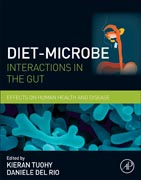
Diet-Microbe Interactions in the Gut: Effects on Human Health and Disease
Tuohy, Kieran
Del Rio, Daniele
Drawing on expert opinions from the fields of nutrition, gut microbiology, mammalian physiology, and immunology, Diet-microbe Interactions for Human Health investigates the evidence for a unified disease mechanism working through the gut and its resident microbiota, and linking many inflammation-related chronic diet associated diseases. State of the art post-genomic studies can highlight the important role played by our resident intestinal microbiota in determining human health and disease. Many chronic human diseases associated with modern lifestyles and diets - including those localized to the intestinal tract like inflammatory bowel disease and celiac disease, and more pervasive systemic conditions such as obesity, diabetes and cardiovascular disease - are characterized by aberrant profiles of gut bacteria or their metabolites. Many of these diseases have an inflammatory basis, often presenting with a chronic low-grade systemic inflammation, hinting at persistent and inappropriate activation of inflammatory pathways. Through the presentation and analysis of recent nutrition studies, this book discusses the possible mechanisms underpinning the disease processes associated with these pathologies, with high fat diets appearing to predispose to disease, and biologically active plant components, mainly fiber and polyphenols, appearing to reduce the risk of chronic disease development. One comprehensive, translational source for all aspects of nutrition and diet's effect on gastrointestinal health and diseaseExperts in nutrition, diet, microbiology and immunology take readers from the bench research (cellular and biochemical mechanisms of vitamins and nutrients) to new preventive and therapeutic approachesClear presentations by leading researchers of the cellular mechanisms underlying diet, immune response, and gastrointestinal disease help practicing nutritionists and clinicians (gastroenterologists, endocrinologists) map out new areas for clinical research and structuring clinical recommendations INDICE: 1. The human gut microbiota, composition and activity 2. A nutritional anthropology of the human gut microbiota 3. Probiotics, prebiotics, synbiotics v Obesity associated gut microbiota 4. An apple a day - Reducing metabolic disease risk with polyphenol and fiber rich foods 5. Geo-epigenetics and autoimmune diseases 6. Whole plant foods and colon cancer risk 7. Population level divergence from traditional diets and the risk of cancer and metabolic disease 8. Traditional fermented foods and protection from chronic diseases of modern lifestyle: evidence and possible mechanisms 9. Bioactivation of high molecular weight polyphenols by the gut microbiome 10. Extending the hygiene hypothesis - The passengers and the pirates 11. Probiotic microorganisms for shaping the human gut microbiota - Mechanisms and efficacy into the future 12. Human gut bifidobacteria - Special friends 13. Gut microbial metabolism of plant lignans: Influence on human health 14. Diet, the gut: Brain axis and autism 15. Gut microbiome modulates dietary xenobiotic toxicity: A review of the literature 16. Gut microbiota: Immune cross talk, implications for metabolic disease
- ISBN: 978-0-12-407825-3
- Editorial: Academic Press
- Encuadernacion: Cartoné
- Páginas: 256
- Fecha Publicación: 13/10/2014
- Nº Volúmenes: 1
- Idioma: Inglés
